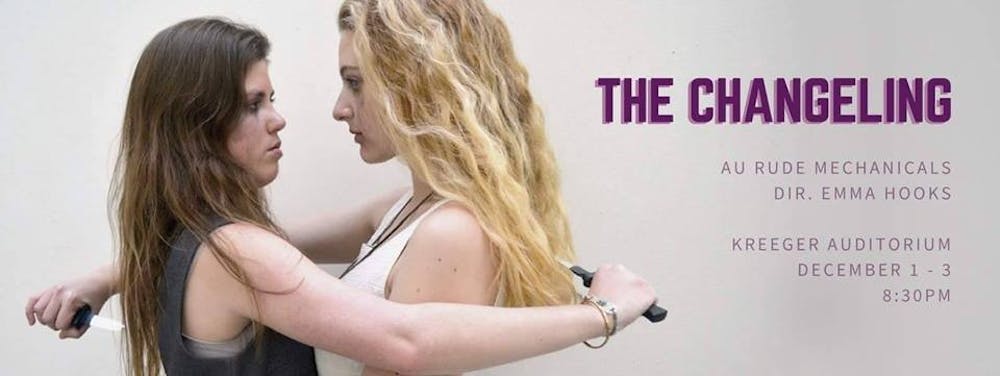It has never been easy to be a woman. As I wandered through a dimly lit parking lot on Nov. 30 on my way to to see sophomore director Emma Hooks’ production of “The Changeling,” I was struck with how vulnerable my gender has made me. The list of things I cannot do is far longer than the list of things that I can. After all, I am only a woman and woman was not formed on her own; rather, she comes from Adam’s rib. For these reasons, “The Changeling” -- and its ability to question gender and the rigidity of religion that frequently binds women in its clutches -- resonated deeply with me.
This year, the AU Rude Mechanicals have a strong leader in its executive director, junior Elizabeth Morton, and its artistic director, junior Perry Scalfano. I remain impressed and humbled by the Rudes’ ability to create immersive, thought-provoking and emotional experiences. In the past, I have never been a fan of William Shakespeare or his contemporaries, but seeing so many of the Rudes’ performances have led me to a change of heart.
Hook’s “Changeling” is a contemporary adaption of a Jacobean era play written by Thomas Middleton and William Rowley. Set in religious modern day Spain, Beatrice-Joanna (freshman Sabrina Koss) is betrothed to Alonzo (freshman Jake Andrejat). However, Beatrice-Joanna is secretly in love with Alsemero (freshman Lukas Lehmann) and hopes to marry him, despite what her father, Vermandero, (junior Ryan Guerra), has arranged.
In order to secure her marriage to Alsemero, Beatrice-Joanna hires her father’s servant DeFlores (freshman Shae McDonald) to kill Alonzo. Because DeFlores is in love with Beatrice-Joanna, DeFlores obliges. Due to Alonzo’s death, Beatrice-Joanna is able to marry Alsemero. However, Alonzo’s sister, Tomaza (freshman Victoria Aumack), remains suspicious of Vermandero’s household. Roping her maid into the plot (freshman Maggie Shircliff), Beatrice-Joanna struggles to hide the truth and her growing love for DeFlores.
With several storylines compacted into one act, “The Changeling” moves at a brisk and engaging pace. Hooks’ direction is concise, with minimal set pieces and scene changes. Her selection of actors is superb. I found myself so immersed in the performance that I did not realize that the fifty minutes of its runtime had passed when the final bows were taken.
Additionally, praise goes to production manager, senior Rebecca Silva, lighting design assistant, freshman Jamie Gottlieb and sound designer, senior Callie Trawick. Together, their expert management of elaborate lighting and music enhanced the mood of suspense and tension.
Throughout the performance, religion remains a constant. Whether signified in action, such as prayer, or by the crucifix that Beatrice-Joanna wears around her neck, the weight of religion is present. The sin of murder seems inconsequential when it is compared to the sin of forbidden, same-sex love.
It is refreshing to see a character struggle with her sexuality as Koss so brilliantly portrays. For Beatrice-Joanna, loving both men and women is something that conflicts with the mere nature of her being and community. McDonald’s portrayal as the tortured DeFlore is often stilted and stone faced in comparison to Koss.
However, McDonald’s final moments onstage are superb. The tempered emotions that explode at the end of the play are a cumulation of frustration, rage and, most surprisingly, love. DeFlores, however unhinged she may be, knows that this is not a world in which she and Beatrice-Joanna can love each other.
In many ways, “The Changeling” is reminiscent of a film noir. Men like Alonzo, Alsemero and Vermandero are oblivious chumps while women like Beatrice-Joanna, DeFlores and Tomaza plot and scheme. At one point, Beatrice-Joanna tells DeFlores, “Would creation had formed me man . . . oh ‘tis the soul of freedom!” The anguish and conflict in Koss’ performance shows Beatrice-Joanna’s struggle to accept her gender and the reality that it brings: to be a woman is to be caged, to have decisions made for her by men.
It is only with acts of violence that Beatrice-Joanna is able to find liberation from the men who dictate who she should be. Ironically, it is those acts of violence which propel Tomaza into a role of vengeance, strength and individuality as she seeks to find her brother’s killer. She is the strongest woman on the stage and, in her fiery performance, Aumack shows that Tomaza knows the power within herself.
Being a woman is often messy and frustrating, but Hooks’ direction, her actors’ performances and her team of assistant director, sophomore Emma Hoss, and stage manager, freshman Quinn Anderson, harness the control, authority, energy and depth in every woman. I am better off for having seen “The Changeling” and now more than ever, I am grateful and proud to be a woman, despite the obstacles in my way.
Naomi Zeigler is a senior in the College of Arts and Sciences and is the Opinion Editor for The Eagle.





